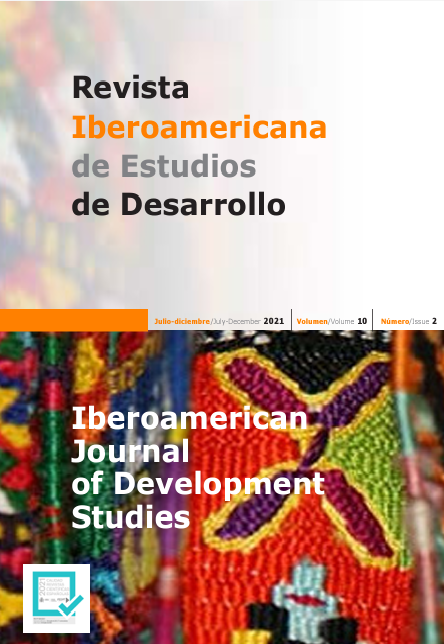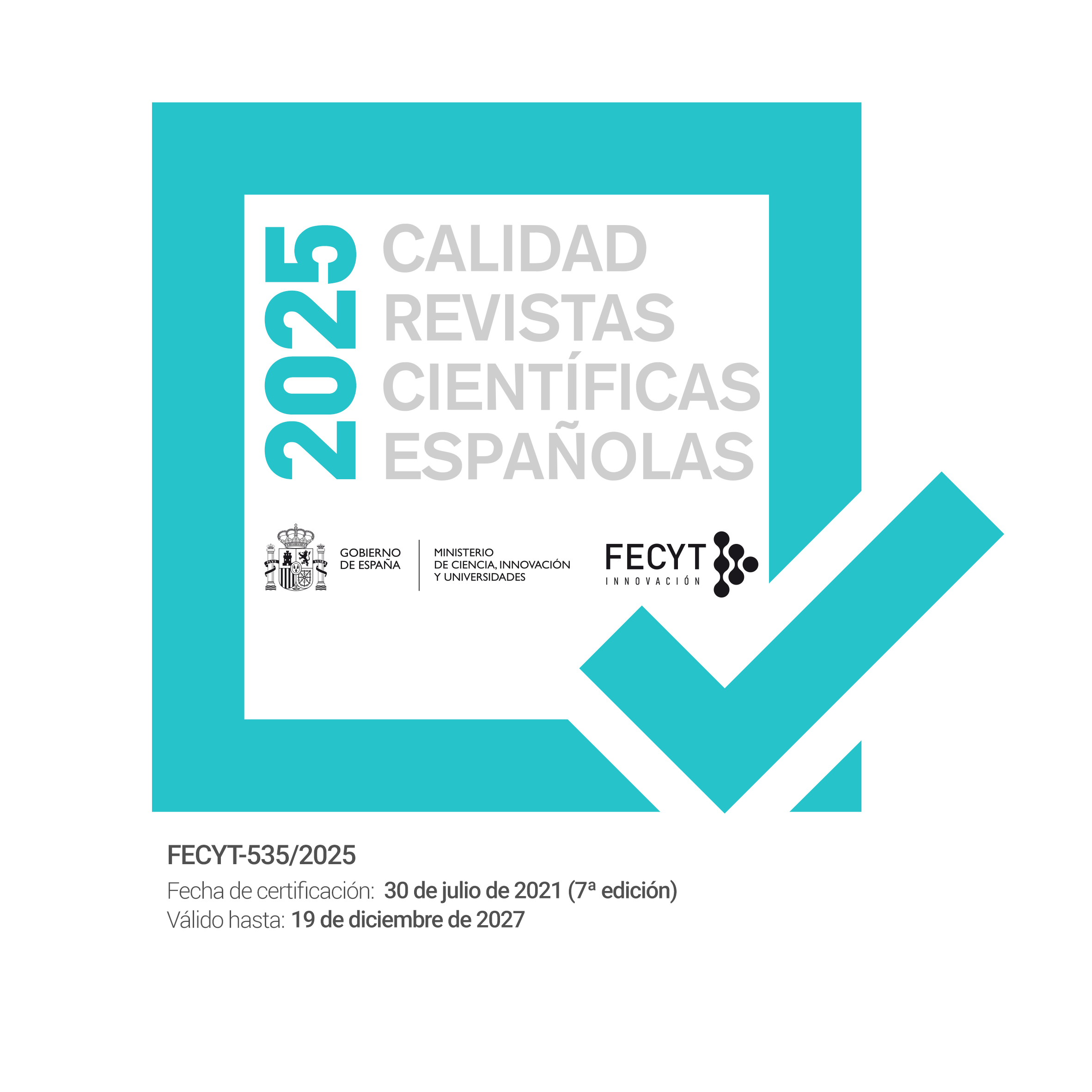Industria del petróleo, orden económico y orden político: estudio comparativo de Ghana y Guinea Ecuatorial
DOI:
https://doi.org/10.26754/ojs_ried/ijds.600Palabras clave:
Ghana, Guinea Ecuatorial, petróleo, maldición de los recursos, economía políticaResumen
En este artículo, se exploran los elementos condicionantes de las dinámicas económicas y políticas en torno a la extracción de hidrocarburos en dos países del golfo de Guinea: Ghana y Guinea
Ecuatorial. Para ello, atenderemos a las similitudes y diferencias entre ambos casos, a partir de los elementos teóricos señalados por el paradigma de la maldición de los recursos, perspectiva que utilizaremos de manera crítica. Las diferencias en relación con la importancia cuantitativa de los recursos petroleros respecto del total del ingreso nacional, el desarrollo regulatorio, la transparencia
en la gestión de las rentas petroleras y la calidad institucional son algunas de las divergencias más importantes. No obstante, estos casos también presentan importantes similitudes; por ejemplo, en
relación con el escaso rol que desempeña la especialización petrolera para favorecer la inserción regional, así como el gran reto de articular encadenamientos productivos entre la industria extractiva y el entramado empresarial local.
Descargas
Referencias
ABAGA EDJANG F (1997). La ayuda externa en el desarrollo de Guinea Ecuatorial. La Catarata, Madrid.
ABLO AD (2015). Local content and participation in Ghana’s oil and gas industry: Can enterprise development make a difference? The Extractive Industries and Society 2(2):320-327.
ABLO AD, OVERÅ R (2015). Networks, trust and capital mobilisation: challenges of embedded local entrepreneurial strategies in Ghana’s oil and gas industry. The Journal of Modern African Studies 53(3):391-413.
ACKAH-BAIDOO A (2012). Enclave development and «offshore corporate social responsibility»: implications for oil-rich sub-Saharan Africa. Resources Policy 37(2):152-159.
ACKAH-BAIDOO A (2013). Fishing in troubled waters: oil production, seaweed and community-level grievances in the Western Region of Ghana. Community Development Journal 48(3):406-420.
ADISI, AIDS-FREE WORLD, ASODEGUE, APDHE, CEID-GE, CESGE, EG JUSTICE, NEWSeta (2018). Guinea Ecuatorial Examen Periódico Universal: Tercer Ciclo 33va Sesión. Informe sobre la situación de los derechos civiles y políticos en Guinea Ecuatorial.
ADJEI M, OVERÅ R (2019). Opposing discourses on the offshore coexistence of the petroleum industry and small-scale fisheries in Ghana. The Extractive Industries and Society 6(1):190-197.
ADUSAH-KARIKARI A (2015). Black gold in Ghana: Changing livelihoods for women in communities affected by oil production. The Extractive Industries and Society 2(1):24-32.
AMPONSAH-TAWIAH K, DARTEY-BAAH K (2011). The mining industry in Ghana: a blessing or a curse. International Journal of Business and Social Science 2:62-69.
AUTY R (1993). Sustaining Development in Mineral Economies. The Resource Curse Thesis. Routledge, Londres.
AUTY R. (2008). Political Economy of African Mineral Revenue Deployment. Angola, Botswana, Nigeria and Zambia Compared, WP 28/2008. Real Instituto Elcano, Madrid.
BEBLAWI H, LUCIANI G (eds.) (1987). The Rentier State. Croom Helm, Nueva York.
BEBLAWI H, LUCIANI G (eds.) (2015). The Rentier State. Routledge.
BIDAURRATZAGA-AURRE E, COLOM-JAÉN A, MARÍN EGOSCOZÁBAL A (2020). Integración y transformación económica en África: potencial y limitaciones del Área de Libre Comercio Continental Africana. Iberoamerican Journal of Development Studies. En prensa.
BRUNNSCHWEILER CN, BULTE EH (2008). The resource curse revisited and revised: A tale of paradoxes and red herrings. Journal of environmental economics and management 55(3):248-264.
CAMPOS SERRANO A (2013). Extraction offshore, politics inshore, and the role of the State in Equatorial Guinea. Africa: Journal of the International African Institute 83(2):314-339.
CIA (2020). World Factbook.
COLOM-JAÉN A (2020). Las relaciones económicas UE-África en la era post-Cotonú. En: Domínguez I, Aimé E (coords.). Informe África 2020. Fundación Alternativas, MadridFundación Alternativas: 22-36.
COLOM-JAÉN A, CAMPOS-SERRANO A (2013). Oil in Chad and Equatorial Guinea: Widening the focus of the resource curse. The European Journal of Development Research 25(4):584-599.
CORDEN WM, NEARY JP (1982). Booming sector and de-industrialisation in a small open economy. The economic journal 92(368):825-848.
ECONOMIST INTELLIGENCE UNIT (2020). Informe de país. Ghana. EIU.
ECONOMIST INTELLIGENCE UNIT (2020). Informe de país. Guinea Ecuatorial. EIU.
ESCRIBANO G (1999). Guinea Ecuatorial: de la ayuda al petróleo. Revista Meridiano CERI 26:12-16.
FERGUSON J (2006). Global shadows: Africa in the neoliberal world order. Duke University Press.
FREE HOUSE (2020). Freedom in the World: Equatorial Guinea Country Report. Free House.
GOUX C (1974). Oú en sommes-nous? JC. Lattès, París, pp. 59-67.
GRAHAM E, ACKAH I, ANDREWS N, VAN GYAMPO RE (2019). Escaping the «Oil Curse»: Is Ghana on the right path? The African Review 46(1):235-263.
GRAHAM E, VAN GYAMPO RE, ACKAH I, ANDREWS N (2019). An institutional assessment of the public interest and accountability committee (PIAC) in Ghana’s oil and gas sector. Journal of Contemporary African Studies 37(4):316-334.
GRUNWALD J (1961). La escuela estructuralista, estabilización de precios y desarrollo económico: el caso chileno. El Trimestre Económico, julio-septiembre.
GYEYIR DM (2019). The Ghana Stabilisation Fund: Relevance and Impact so far. Energy Policy 135.
INTERNATIONAL MONETARY FUND (IMF) (2007). Guide on Resource Revenue Transparency. IMF.
INTERNATIONAL MONETARY FUND (IMF) (2010). Republic of Equatorial Guinea: 2010 Article IV Consultation. Country Report No. 10/103.
JENSEN N, WANTCHEKON L (2004). Resource wealth and political regimes in Africa. Comparative political studies 37(7):816-841.
KARL TL (1997). The paradox of plenty: Oil booms and petro-states (vol. 26). University of California Press.
KARL TL (2005). Understanding the Resource Curse. Covering Oil. A Reporters Guide to Energy and Development. Open Society Institute, Nueva York, pp. 21-26.
KOPINSKI D, POLUS A, TYCHOLIZ W (2013). Resource Curse or Resource Disease? Oil in Ghana. African Affairs 112:583-301.
KRUGMAN P (1987). The narrow moving band, the Dutch disease, and the competitive consequences of Mrs. Thatcher: Notes on trade in the presence of dynamic scale economies. Journal of development Economics 27(1-2):41-55.
LEDERMAN D, MALONEY WF (2007). Natural Resources. Neither Curse nor Destiny, Stanford, University Press, Stanford, pp. 1-12.
MAHDAVY H (1970). The Patterns and Problems of Economic Development in Rentier States. The case of Iran. En: Cook MA (ed.). Studies in the Economic History of Middle East, Oxford UP.
MARCHAL A (1959). Systèmes et structures économiques. PUF, París.
MCFERSON HM (2009). Governance and hyper-corruption in resource-rich African countries. Third World Quarterly 30(8):1529-1547.
NACIONES UNIDAS (2019). Observaciones finales sobre Guinea Ecuatorial en ausencia de su informe inicial. Pacto Internacional de Derechos Civiles y Políticos. Comité de Derechos Humanos. Naciones Unidas.
OBENG-ODOOM F (2014a). Black Gold in Ghana: Crude Days for Fishers and Farmers? Local Environment 19(3):259-282.
OBENG-ODOOM F (2014b). Oil, sex, and temporary migration: the case of Vienna City, Sekondi-Takoradi, Ghana. The Extractive Industries and Society 1(1):69-74.
OBENG-ODOOM F (2014c). Oiling the Urban Economy: land, labour, capital, and the state in Sekondi-Takoradi, Ghana. Routledge.
OFFICE OF THE HIGH COMMISSIONER ON HUMAN RIGHTS (2007). Report of the Working Group on Arbitrary Detention: Mission to Equatorial Guinea, 8-13 July, A/HRC/7/4/Add.3.
OKPANACHI E, ANDREWS N (2012). Preventing the oil «resource curse» in Ghana: Lessons from Nigeria. World Futures 68(6):430-450.
OWUSU B (2018). Doomed by the «Resource Curse?». Fish and Oil Conflicts in the Western Gulf of Guinea, Ghana. Development 61(1-4):149-159.
PEPRAH JA (2011). Women, livelihood and oil and gas discovery in Ghana: An exploratory study of Cape Three Points and surrounding communities. Journal of sustainable development 4(3):185.
PIAC (2019). Annual Report of management and use of the petroleum revenues for the period January-December 2019. Public Interest and Accountability Committee.
PIGEAUD F, SYLLA NS (2018). L’arme invisible de la Françafrique. Une histoire du Franc CFA. Ed. La Découverte.
ROSS ML (2001). Does Oil Hinder Democracy. World Politics 53:325-361.
SACHS JD, WARNER AM (1995). Natural resource abundance and economic growth. No. w5398. National Bureau of Economic Research.
SACHS JD, WARNER AM (1999a). Natural resource intensity and economic growth. En: Mayer J, Chambers B, Farooq A (ed.). Development policies in natural resource economies: 13-38.
SACHS JD, WARNER AM (1999b): The big push, natural resource booms and growth. Journal of development economics 59(1):43-76.
SACHS JD, WARNER AM. (2001). The curse of natural resources. European Economic Review 45(4-6):827-838.
SAMPEDRO JL, BERZOSA C (2012). La inflación. Debate, Madrid.
SÁNCHEZ DÍEZ Á, GARCÍA DE LA CRUZ JM, DEL SUR MORA A (2015). Comercio internacional, materias primas y enfermedad holandesa: estudio comparativo de los efectos estáticos en Noruega y Chile. Revista de Economía Mundial (39):179-199.
SANTISO J (2012). Fondos soberanos. ESADE y KPMG.
SUNKEL O (1958). La inflación chilena: un enfoque heterodoxo. Trimestre Económico 25(4), reproducido en Cincuenta años del pensamiento de la Cepal: textos seleccionados. Fondo de Cultura Económica/Cepal, 1998, vol. 1:287-323.
THE FUND FOR PEACE (2020). Fragile states index annual report 2020. The Fund for Peace.
THOMAS KOJO S (2019). Framework for petroleum revenue management in Ghana: current problems and challenges. Journal of Energy & Natural Resources Law 37:1:119-143.
TORVIK R (2001). Learning by doing and the Dutch disease. European economic review 45(2):285-306.
VAN WIJNBERGEN S (1984). Inflation, employment, and the Dutch Disease in oil-exporting countries: A short-run disequilibrium analysis. The Quarterly Journal of Economics 99(2):233-250.
WICK K, BULTE E (2009). The curse of natural resources. Annual Review of Resource Economics 1(1):139-156.
WILLIAMS RE (2011). From Malabo to Malibu: addressing corruption and human rights abuse in an African petrostate. Human Rights Quarterly 33(3):620-648.
YATES DA (1996). The Rentier State in Africa. Oil Rent Dependency and Neocolonialism in the Republic of Gabon. Africa World Press, Trentonm, NJ.
Descargas
Publicado
Número
Sección
Licencia
Derechos de autor 2021 Ángeles Sánchez-Díez, Alicia Campos-Serrano

Esta obra está bajo una licencia internacional Creative Commons Atribución-NoComercial-SinDerivadas 4.0.



